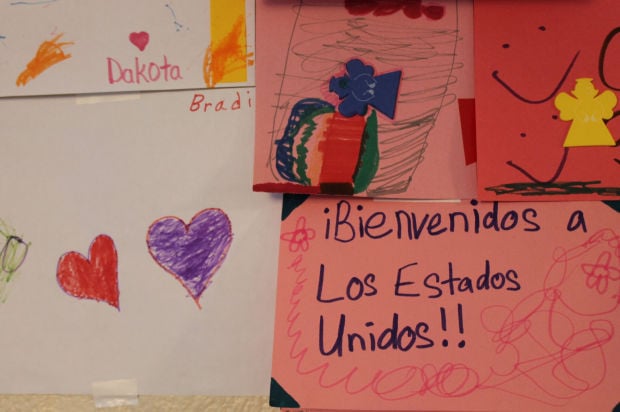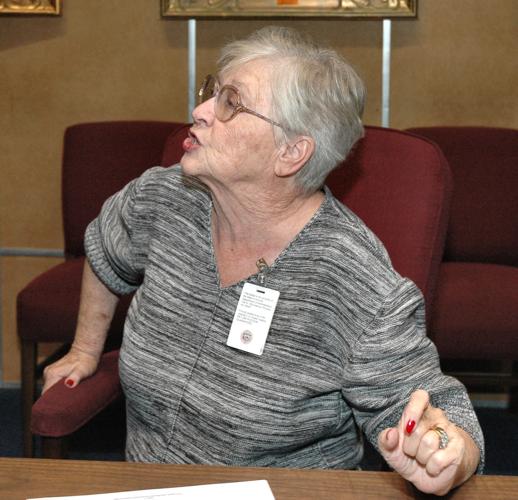PHOENIX — Unable to block the federal government from sending refugees to Arizona, six Republican lawmakers want to penalize the charities that help them resettle here.
Sen. Judy Burges of Sun City West is leading the effort. Her legislation, SB 1468, would specifically require the Arizona Department of Economic Security to suspend its participation in the federally funded refugee resettlement program.
But as other states that have taken similar steps found, that would not stop the refugees. The federal government would continue to send people to the state, but without cooperation and coordination with the state.
So, the potentially more far-reaching part of Burges’ legislation would impose a fine on charities of $1,000 a day for each refugee they help place in the state. And if a refugee is arrested, the charity would be financially liable for the cost of arrest, prosecution and incarceration.
Burges said she’s using that approach because, realistically, it’s the only option available to her to stem the flow of refugees.
The measure concerns Ron Johnson, who lobbies for Catholic Charities, one of the groups involved in helping refugees resettle in the state.
“Obviously we’re all concerned with proper vetting and national security,” he said. “But that’s not something we do with Catholic Charities. Once they’re here, we help them find a job, find a place to live, learn the language, all kind of good things that help them be a part of society so they’re not dependent on the government.”
Johnson said Burges and other sponsors of SB 1468 are focusing on the wrong end of the problem.
“To punish the Good Samaritans that are trying to help them is a bit misplaced,” he said. “These people are already here.”
Burges was unsympathetic.
“I’ve talked to Ron Johnson myself,” she said. “And I know that they get millions of dollars to administer these programs.”
“She’s probably talking nationally,” Johnson responded, noting there are more than 80,000 refugees being resettled this year. “I won’t deny that helps keep these programs running.”
But Johson said it would be wrong to say that Catholic Charities is somehow making money on the programs.
“There’s also local donations to help make ends meet,” he said.
Burges said she wasn’t saying that groups that work with refugees are in it for the money.
“As a charitable organization, they feel it’s their responsibility,” she said.
But she said the state needs to have some say over who comes here.
“They’re being forced on us,” Burges said.
The Department of Economic Security, which operates the state Refugee Resettlement Program that Burges’ legislation would shut down, reports that it settled 4,833 people in the state in the last federal fiscal year, Oct. 1, 2015, through Sept. 30, 2016.
There were 4,138 refugees resettled in Arizona the prior year and 3,882 the year before that.
The largest share of last year’s refugees, more than 1,100, came from the Democratic Republic of the Congo. But there also were 715 from Syria, 610 from Somalia and 462 from Iraq, all countries that are listed on President Trump’s executive order suspending refugees.
Other sponsors of the legislation include Sen. Sonny Borrelli of Lake Havasu City and Reps. Mark Finchem of Oro Valley, Vince Leach of Tucson, Anthony Kern of Glendale and Don Shooter of Yuma.
Even if SB 1468 is adopted, it appears it would not alter how many refugees end up in Arizona.
That, however, could change.
Two Republican U.S. senators from Texas introduced legislation last month to let governors block the federal government from resettling refugees in their states.
As crafted by Ted Cruz and Ted Poe, the State Refugee Security Act would require the federal government to notify a state at least 21 days before a refugee is resettled there. A governor, at his or her “sole discretion,” could veto the move absent “adequate assurance that the alien does not present a security risk to the state.”
In 2015, Arizona Gov. Doug Ducey asked the federal government to immediately halt placement of new refugees in Arizona. That came in the wake of reports that at least one of the people involved in a suicide bombing in Paris had slipped into Europe as a refugee.
The governor cited a provision of federal law that he said entitles him to “immediate consultation by federal authorities” of plans to resettle any refugees in the state. Ducey’s request, however, was not limited to Syrian refugees.
What Ducey got as a result was to be included in a conference call with other governors and federal officials detailing their screening efforts.





